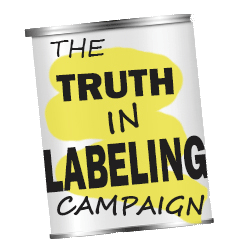Dr. Stephanie Seneff’s 2021 book Toxic Legacy: How the Weedkiller Glyphosate Is Destroying Our Health and the Environment, dissects the truth about glyphosate, a toxic chemical incorporated into hundreds of weed-killing formulations – the most widely known being Roundup.
Seneff, a senior research scientist at MIT’s Computer Science and Artificial Intelligence Laboratory, documents the case against glyphosate, that she describes as a chemical that can deliver the “slow kill” as it gradually accumulates in your tissues and over time becomes the catalyst for some “horrible diseases.”
Seneff connects use of the herbicide with a long list of illnesses and conditions including kidney and liver disease, diabetes, multiple types of cancers, urinary tract infections, antibiotic resistance, mineral deficiencies, and the destruction of our beneficial gut bacteria leading to immune-system malfunctions.
If you follow the Truth in Labeling Campaign blogs or have visited our website, you know that we have lots of information on glutamate: How protein (meat, chicken, fish, milk, etc.) contains bound glutamate along with other amino acids that, when normally digested, are vital for normal body function. How free glutamate, which is found in monosodium glutamate (MSG) and dozens of other food additives, differs from the glutamate found in nature. And how, when glutamate is present in the body in excess, it causes brain damage.
Seneff, however, describes a new dimension of danger.
She links glyphosate exposure to glutamate neurotoxicity, noting that the weedkiller interferes with the mechanisms that prevent excess – brain damaging — glutamate from accumulating. As told in Toxic Legacy, “Roundup increased the amount of glutamate released into the synapse (the point of communication) by neurons. It also interfered with the ability of brain cells to clear glutamate from the synapses by converting glutamate to glutamine.”
Seneff describes the normal cycle of glutamate production and clearance, an amazingly complex system that depends on the trace mineral manganese to prevent the accumulation of excess – brain damaging — glutamate. And manganese “can be chelated by glyphosate, making it unavailable.”
As Seneff says, “There is no question that glyphosate disrupts glutamate.”
Seneff also makes it clear that excess glutamate “is a known factor in several neurological disorders, including depression. Abnormally high levels of glutamate lead to excessive oxidative stress in the brain, causing neuronal damage, particularly in the hippocampus.”
But avoiding glyphosate, like avoiding free glutamate, is a challenge.
Glyphosate-based herbicides, which are totally unregulated and available just about anywhere, are sprayed in back yards, driveways and parks. They are also doused on hundreds of millions of acres of genetically modified crops, such as corn, cotton and soy, and are sprayed on non-organic wheat, barley and oats to speed up drying. Despite the fact that glyphosate is considered a “probable” human carcinogen by the World Health Organization and currently the subject of thousands of lawsuits over its role in causing non-Hodgkin’s lymphoma and other cancers, it sells like water in the desert.
Free glutamate found in MSG, yeast extract, hydrolyzed proteins and dozens of other flavor enhancers as well as protein substitutes, shows up in processed foods from soup to nuts. In addition, the latest big sellers, plant-based protein foods, are typically loaded with free glutamate. The Impossible Burger, for example, contains six potentially brain-damaging ingredients that include soy-protein concentrate, natural flavors and yeast extract.
Despite the pervasive nature of both glyphosate and free glutamate, there are still some steps you can take to avoid these toxins as much as possible.
Glyphosate:
- If you can’t implement a totally organic lifestyle, always shop organic for the Big Five GMO foods: Corn, canola, sugar beets, soy and cotton (cottonseed oil is used in conventional nuts and chips, while canola is used in just about everything, as is corn and soy);
- Buy organic dairy as well, since genetically modified alfalfa is extensively fed to dairy cows;
- Whenever possible, buy organic versions of any products containing oats, wheat and beans, which don’t have to be genetically modified to be sprayed with glyphosate as a drying agent shortly before harvest.
- When outside, steer clear of areas that have had pesticides applied, sometimes indicated by a white flag.
Free Glutamate:
- Make it a habit to avoid processed foods, especially ones that say “No MSG added” on the label;
- Download our brochure listing the names of ingredients containing free glutamate;
- Avoid mock meat, fake fish or other faux foods.
Even without the helping hand of glyphosate, free glutamate is associated with Parkinson’s disease, Alzheimer’s, MS, stroke, ALS, autism, schizophrenia, depression and many other neurological conditions. Remember, the brain you save may be your own.


